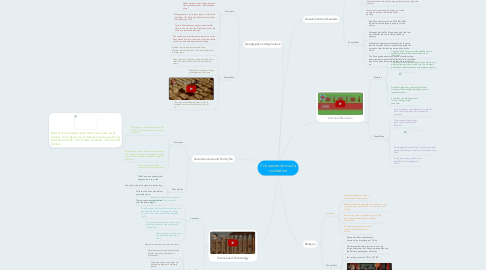
1. Geography and Agriculture
1.1. Sumerians
1.1.1. The Sumerians lived in Mesopotamia. Mesopotamia means "land between rivers."
1.1.2. Mesopotamia is a dry plain region in which two rivers flow. The Tigris and Euphrates rivers flow into the Persian Gulf
1.1.3. Land in Mesopotamia was extremely fertile close to the river, but the further away from the rivers, the worse the land was.
1.1.4. The fertile land near the rivers were some of the best places ti farm in the world. In the less fertile lands, nomads herded goats and sheep.
1.2. Shang/Zhou
1.2.1. Divided into western and eastern Zhou. Western was the first years of it and eastern was the later years
1.2.2. They had many irrigation systems for their crop fields. the water came from the surrounding rivers
1.2.3. They lived in farming villages in-between the two rivers
1.2.4. They also lived in Mesopotamia. which provided them with fertile soil to live off of.
2. Social structure and Family life
2.1. Sumerians
2.1.1. The people in the highest class could read and write the Sumerians complex scripture.
2.1.1.1. Most of the Sumerians population was made up of farmers. The highest social class was made up of King sand there family. Then Priests, Courtiers, officials, and Soldiers.
2.1.2. Most people were in the lower class because when they were young, there parents needed them to help on the farm instead of getting educated.
2.1.3. Women were very highly accepted. Women were aloud to
2.2. Shang/Zhou
2.2.1. The Zhou was a dynasty that adapted tools very well
2.2.2. They have made big steps into technology
2.2.3. With this the Zhou had almost complete power
2.2.4. There power was never limited with this technology
3. Science and Technology
3.1. Sumerians
3.1.1. Sumerians invented the wheel, used for pottery and for a variety of vehicles.
3.1.2. The Sumerians had a number scale based on the base 60. This led to having 60 minute hours, 24 hour days, and the 360 degrees circle.
3.1.3. The Sumerians were able to build large buildings because of there advanced mathematics.
3.1.4. The Sumerians' doctors were very talented with healing herbs
3.2. Shang/Zhou
3.2.1. Began iron casting and used iron tools
3.2.2. Development of warfare technology like iron weapons, chariots and fortifications
3.2.3. They were the first to gather silk, by feeding silkworms mulberry leaves.
3.2.4. Copper coins were the first metal used for coin money and the first that Zhou used.
4. Arts and Education
4.1. Sumerian
4.1.1. They had both an consonantal alphabet,and a syllabic systems, which became known as cuneiform.
4.1.2. They used a math system based off of 60, which is why we divide an hour into 60 min. They learned geometry to build structures and irrigation systems.
4.1.3. Cuneiform began as picture symbols but developed into wedge-like shapes used to represent sounds.
4.1.4. Sumerians created the earliest form of writing, called cuneiform.
4.2. Shang/Zhou
4.2.1. Jade ornaments and objects were made for both ritual ceremonies and ornamental purposes.
4.2.2. Not many painted pictures have survives through the Zhou era
4.2.3. Calligraphy (Chinese Writing) had first appeared during the Shang era and now blossomed in the Zhou
4.2.4. It was also during the Zhou era that Nail Art first appeared in China.
5. Government and Leaders
5.1. Sumerian
5.1.1. The Sumerians formed City-States composed of the city itself, and miles of farmland around it.
5.1.2. These City-States frequently attacked each other and the conquering ruler was known as the Overlord or High King
5.1.3. From the Sumerians writing on clay tablets, we have learned that the Sumerians had a court. Like America, there had to be clear evidence of the victim being guilty otherwise they were innocent
5.1.4. Most crimes were repaid by fines, but some people would also receive the death penalty.
5.2. Shang/Zhou
5.2.1. The Zhou Dynasty ran from 1045 BC to 256 BC which was the longest ruling in Chinas history
5.2.2. Many people like Wu Wang was one of the few men that wanted to over throw the Zhou dynasty
5.2.3. Mandate of heaven was introduced by the early leaders of the Zhou and it taught the people the concept of that the leaders were picked by the Gods
5.2.4. The Zhou government was based on feudal system where the leader would divide the land and let others lead those parts but of course they were relatives of his
6. Religion
6.1. Sumerian
6.1.1. Practiced polytheism which is the worship of many gods.
6.1.2. Believed that the gods were like humans in many ways, they ate, drank, fell in love, married, and fought.
6.1.3. Worked very hard to please the gods. The built ziggurats and temples and held ceremonies.
6.1.4. The gods had great power and they controlled all natural forces.
6.2. Shang/Zhou
6.2.1. Shang and Zhou dynasties are known as the bronze age of China.
6.2.2. The later periods were famous for two big things, they were the Chinese philosophies and the Chinese philosopher Confucius
6.2.3. those things lived for 551 to 479 BC
6.2.4. Many of these teachings changed the impact of there culture for the rest of the history of ancient China
